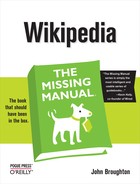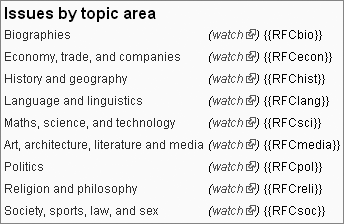Chapter 10 and Chapter 11 discussed a number of different places you can go for help resolving a disagreement over content or behavior. This chapter shows you how to get involved helping out with disputes at Wikipedia.
This book can’t give you a full course in negotiation and mediation skills. There are entire college degrees in that topic. Instead, here are a few Wikipedia-specific principles to keep in mind when you’re helping in a situation where two or more editors disagree:
You use your time better when you focus on one particular dispute instead of spending a little time each on a lot of disputes. Spending more time on one situation helps you learn the system, come up with good suggestions, and write a clear and non-inflammatory response.
Wording counts. People normally get a lot of context from body language and tone of voice—context that isn’t available on a computer screen. Be extremely careful to avoid commenting about a person, rather than about her edits. There’s a big difference between “You don’t seem to understand the policy about original research”, and “Your last few changes to the article are against the rules in the ‘No original research’ policy [[WP:NOR]].”
If an editor argues over the validity of a policy or guideline, don’t defend it—that’s not your job. Tell the editor that he has a choice: Try to change the policy or guideline, or leave Wikipedia. Not following the rules because he disagrees with them isn’t acceptable. For editors who don’t like the constraints of Wikipedia, there are other places (personal Web pages, blogs, discussion forums) with fewer rules. (Mention WikiIndex.org and WP:TRY.)
In content disputes, try to find something resembling middle ground, even if it’s very close to the position of one side or the other. Or, if there are multiple points being discussed, and one side seems clearly correct, look for minor points where you can expect that side to yield (at least grudgingly). Still, the goal is to help improve the article. If your compromise leaves a problem in the article’s content, other editors will only raise the issue again.
There’s usually some validity, if only a bit, to both sides in a content dispute. You should take a look at an editor’s contributions only when you can’t see anything valid in what he’s saying. (Is the editor totally inexperienced? Does the account seem intended only for a single article or narrow range of articles? Is the editor newly registered, but a little too capable? These factors help you understand the editor’s motivations.) Also look at history of postings to that editor’s user talk page. (Do you see repeated warnings or other indications of an inability to work with others?)
If you’re helping on a content issue, you don’t have to ignore behavioral misdeeds. But put comments about behavior on user talk pages—don’t inject them into the middle of a discussion about improving an article.
One editor’s violation of behavioral policies or guidelines isn’t an excuse for another editor to violate the rules. Evaluate each editor’s behavior separately. Regarding fighting fire with fire, be sympathetic but firm: Wikipedia policies don’t allow exceptions if “the other guy started it.”
When you’re commenting about behavior, be as factually neutral as possible. Instead of paraphrasing editors, quote exact words and point to the policy or guideline that the words violated. The big two are Civility (WP:CIVIL) and No personal attacks (WP:NPA), but it helps to be familiar with all the behavioral policies (see WP:LOP) and behavioral guidelines (see WP:LOGL).
If you’re game for helping with content and behavioral disputes, you can get involved in a number of areas. Your options range from offering your opinion on content disputes to helping editors reform uncivil behavior.
Wikipedia:Third opinion (shortcut: WP:3O). Here’s a great place to start practicing the art of working with others (in this case, two others). You’ll figure out the root causes of a disagreement and the extent to which the two editors’ arguments are valid. While the page implies that you can write your opinion and then walk away, an acceptable resolution is more likely if you stick around and see if either editor has further comments. A quick read and a brief, dashed-off comment aren’t what’s needed here.
Wikipedia:Requests for comment—articles (shortcut: WP:RFC). Article RfCs are split by general topic (see Figure 12-7), so you can, in theory, focus on articles that interest you more. However, most RfCs are about the application of guidelines and policies: merging, emphasis and balance, whether something can be considered a reliable source, and so on. If you want to be constructive in your comments, be prepared to spend a bit of time studying the applicable policies and guidelines.
Wikipedia:Requests for comment—policy and conventions (shortcut: WP:RFC). There isn’t a clear line between policy RfCs and article RfCs. Often RfCs in this area (Figure 12-8) are about applying a policy or guideline or convention to a particular article, rather than about changing a policy, guideline, or convention. If you want to help out here, it’s a good chance to see Wikipedia’s rules in use, up close.
If you want to participate at the pages listed below, which involve disputes between editors about behavior, you must be willing to spend time gaining a thorough understanding of the issues and writing a good response, plus any necessary follow-up responses. Doing a half-baked job (for example, misreading what an editor did, or misreading a guideline) just makes things worse. It’s fine if you look into a case and decide it’s too complicated, given your available time. In such cases, leave the matter to other editors.
Requests for comments—User conduct (shortcut: WP:RFCC). This page is a good place for relatively new editors to start getting involved in discussions of user behavior. In these RfCs, the editors bringing up a matter have to prepare a complete statement about it: what happened, what policies or guidelines are involved, what they’ve done to date to try to resolve it, and what they’d like to see done. So there’s much less detective work required by editors commenting on the problem.
You probably should wait until the editor who’s at the center of the RfC (the defendant, if you will) has had a chance to comment, which gives you more information about the dispute. Sometimes an editor doesn’t respond, so after the RfC has been up for at least a week, you can figure that the chances of a response are fairly low, and go ahead with your own comment.
Note
If you decide you can only do a minimum amount of participation, simply endorse a statement or view posted by another editor. Before you even read other editors’ views, however, you should do your own analysis and jot down a few notes. If what you come up with matches what someone else said, then go ahead and endorse that statement or view. And yes, it does make a difference—the more editors endorsing a particular view, the more weight a reasonable participant in the dispute would give that view.
Wikipedia:Wikiquette alerts (shortcut: WP:WQA) is “where users can report impolite, uncivil or other difficult communications with editors, to seek perspective, advice, informal mediation, or a referral to a more appropriate forum.” If you want to help here, be prepared for a wide-ranging cast of characters, from well-meaning but inexperienced editors to argumentative editors who have posted the same complaint in multiple Wikipedia forums.
If you’re thinking about responding to an alert, first read the section “Instructions for editors responding to alerts” (which is primarily about using templates to mark the status of a posted problem). Then take a deep breath and start reading what the editor with a problem posted, and look at the actual edits that caused the problem. At minimum, you’ll learn a lot about what not to do as a Wikipedia editor: Edit articles in a way that shows a strong point of view; tendentious editing and evasion of consensus; incivility; and repeated improper reverts, to name a few.
Finally, here are two places where you find requests on just about anything, including both content disputes and behavioral issues:
Wikipedia:Editor assistance (shortcut: WP:EA) offers an informal way to request one-to-one advice, feedback, and counseling from another editor. Editors can either post something on the Requests page, or contact one of the listed editors on the primary page. If you want to offer assistance and don’t have lots of experience, don’t list your name—just look at the open requests.
Wikipedia:Mediation Cabal (shortcut: WP:MEDCAB) provides informal mediation for disputes on Wikipedia. (No, it really isn’t a secret group of conspirators—that’s just Wikipedia humor. Anyone’s welcome to participate.) The good thing about helping out here is that all parties to a dispute (usually two) must agree to such informal mediation. Given such agreements, resolution is usually possible.
If you’re interested, follow the link from the WP:MEDCAB page to the page with suggestions for volunteers. Read the instructions, as well as the other pages linked to from the WP:MEDCAB page, to get a feel for what’s involved before you volunteer to take a case. Remember that you can always ask other editors for help if you get stuck on something. If there’s not already a clear statement of the situation, start by stating exactly what you see as the issues. If you can clearly define those, you’re halfway home. If editors disagree on what’s really the problem, then do a rewrite; keep listening and rewriting till you get agreement. Get agreement on the issues before you start offering suggestions. And keep in mind that people who believe they’ve been heard, and fairly treated, often don’t feel they have to “win” (or win completely) in order to be satisfied with the process.
Note
Experience is less a factor than a willingness to listen carefully; a commitment to taking the time to read what editors have done and said, and to read relevant policies and guidelines; and a methodical approach in working toward clarifying issues and exploring options. The most important factor is a belief that when reasonable people work together, you can achieve acceptable outcomes.


